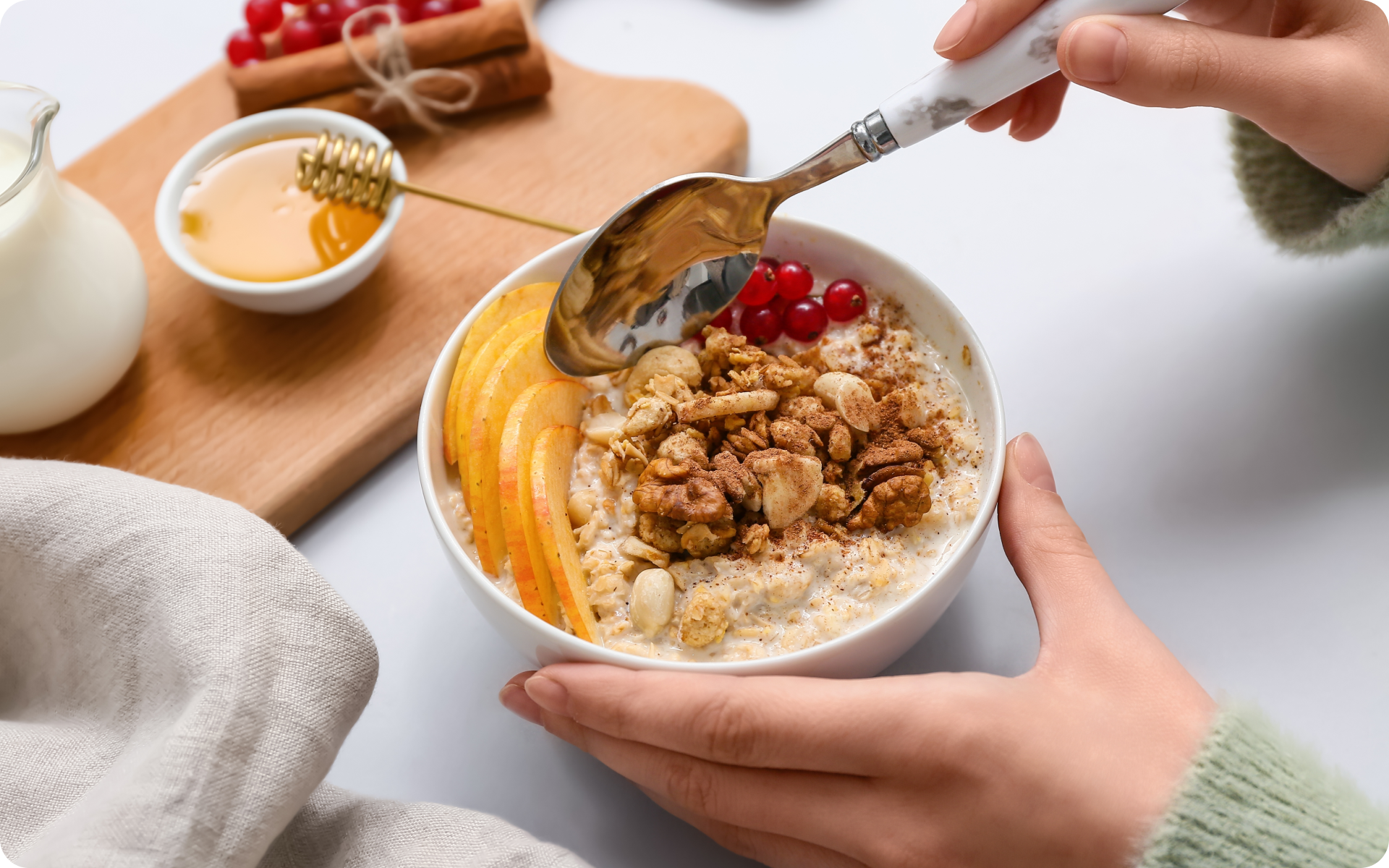Should you spread your calories over 3 meals or stick to a lower frequency? If you’re trying to create a calorie deficit, it can be difficult to know how often you should eat. Will a 3-meals-a-day diet plan work for weight loss, or is it simply another myth?
Let’s discuss this topic in more detail as we look at the history and inspiration of the 3-meals-a-day diet, its benefits, whether there are any links to weight loss, and health tips for this diet plan.
Where Did 3 Meals a Day Come From?
Eating 3 meals a day evolved from many factors, including economic, religious, and socio-cultural beliefs.
Breakfast
In ancient times, Romans would only take one meal at around midday as it was economical and believed to be healthy. They believed this would allow your body enough time to metabolize the food, guaranteeing good digestion. Furthermore, eating more than one meal a day was a form of gluttony to them.
Greeks would eat three meals a day, but there was no designation as breakfast, lunch, or supper/dinner; it was simply the freedom to eat.
In the Middle Ages, people followed a monastic life where they couldn’t eat before the morning mass, and they could only eat meat for half the days of the year.
People began to conceptualize breakfast as the morning meal in the 17th century. American natives would translate it as “break the night’s fast”. By then, people in the aristocratic class were the only ones who had the privilege to take breakfast. The wealthy would consume coffee, tea, and dishes such as scrambled eggs.
The Conception of Lunch and Dinner
Two centuries later, the Industrial Revolution began, and people started to take breakfast and lunch to sustain them as they worked for over six hours. Breakfast was the pre-work meal, while lunch was the half-day meal. After work, many people went home for a hearty meal (dinner), leading to the current habit of three meals.
Before the 19th century, lunch was just a quick snack known as a “beever” or “noonshine”. Later on, it was “nuncheon”, which finally became luncheon or lunch. The revolution continued for a long time, which caused people to ingrain the idea of lunch into their routines.
As workers took their main meal at home after work hours, both the middle and lower classes adopted this eating habit of taking three meals a day. Over the years, the three meals have been further defined as people in Europe and North America now commonly eat toasted bread, coffee, and cereals for breakfast, while lunch and supper tend to be more hearty.
Lean and toned up body isn’t just a far-fetched fantasy. Check out the BetterMe app and watch it propel your weight loss journey into high gear!
Scientific History
No scientific or biological history claims that you should take three meals a day. It’s all a cultural pattern that has grown into a habit. Therefore, scientific studies only try to evaluate whether eating 3 meals a day has benefits over other eating patterns or not.
Why Should We Eat 3 Meals a Day?
Taking three meals a day has its benefits, including:
- Better satiety. You’ll be better able to focus at work or school if you’re not distracted by hunger.
- Management of food intake. You may also be less likely to overeat at mealtimes due to excessive hunger. Some evidence even suggests that eating less often and skipping meals may be associated with obesity (2).
- Good calorie distribution. Distributing your food intake across 3 meals per day can help provide you with the energy you need for all of your daily activities.
The firm belief that three meals a day is healthy remains cultural. Some research has been conducted on meal frequency and how it may influence health markers. However, many studies don’t look specifically at a 3 meal per day pattern, but compare greater meal frequency with lower meal frequency. Their definitions of these meal frequency categories vary.
Some older studies have suggested that greater meal frequency might be associated with reduced total and/or LDL cholesterol levels (14, 9, 19). However, the overall evidence regarding meal frequency and cardiovascular risk factors is varied and inconclusive. (20)
Some older epidemiological studies have also suggested an association between greater meal frequency and a lower risk of obesity (2, 1).
Lastly, another older study found skipping breakfast to be associated with an increased risk of type 2 diabetes in men (4).
We can’t say from these studies that eating 3 meals per day directly reduces chronic disease risk, but it certainly can be a healthy eating pattern as long as your food choices are also healthy and balanced.
Read More: 2 Meals a Day Diet: Definition, Benefits, and How to Do It
Does Eating 3 Meals a Day Work for Weight Loss?
Theoretically, you can use three meals a day to lose weight for several reasons, including:
- You’re likely to eat fewer calories
- You can feel fuller for longer with satisfying meals
- You can practice mindful eating
- You’ll make healthier choices
However, according to scientific studies, there’s still a need for more research. Research has shown that obesity is a growing epidemic with many associated risk factors such as cardiovascular disease, dyslipidemia, and hypertension. Experts recommend several strategies that may influence weight control and loss, including exercises, diets, drugs, meal timing, and meal frequency (17).
Lower BMI
Regarding a 3 meals a day diet plan, some studies have found that fewer meals (one or two) a day leads to a lower BMI (11). However, other factors, such as whether you eat breakfast and how much you snack, can affect the result.
The same study further suggested that eating breakfast, not snacking, and eating your largest meal in the morning may also be effective for preventing long-term weight gain (11).
Other studies have suggested that greater meal frequency is associated with a reduced risk of obesity (2, 1).
At the end of the day, what and how much you eat is more likely to determine whether you gain, lose, or maintain your weight. If eating more or less frequently helps you eat fewer overall calories, then you’re more likely to lose weight with that strategy.
Improved Satiety
Studies have suggested that eating three meals a day may improve satiety and reduce hunger cues compared to higher meal frequency diets (6). In fact, eating small, frequent meals is often recommended for people who need to eat more and gain weight. So sticking with 3 meals a day may help you eat fewer calories and stay on top of your nutritional needs without overeating.
Reduced Decision Fatigue
Decision fatigue occurs when you need to make decisions past your psychological threshold. This causes stress, which can contribute to unnecessary weight gain.
When you follow a three-meals-a-day diet plan, you won’t feel as overwhelmed because you can more easily plan 3 meals as opposed to several. Preparing a meal plan is one of the most effective ways to combat decision fatigue, which may lower your stress levels.
From this discussion, it can be concluded that no particular meal frequency assures weight loss. Whatever strategy can help you eat fewer calories and/or burn more calories every day should help you lose weight. Regarding meal frequency, experiences may vary for every individual, so do whatever works best for you. Most people can be successful on 3 meals per day, as it is the societal norm and fits in well with most people’s lifestyle patterns.
Whether you’re looking to simply pep up your fitness routine, jazz up your diet with mouth-watering low-calorie recipes or want to get your act together and significantly drop that number on your scale – BetterMe app has got you covered! Improve your body and revamp your life with us!
For results, try these 3-meals-a-day weight loss tips below:
- Eat three satisfying meals a day
- Ensure each meal is balanced with all the macronutrients
- Try to eat mindfully
- Plan ahead of meals
- Limit high-calorie, nutrient-poor foods
It should be noted that no dietary frequency guarantees weight loss. Whether you eat six meals a day or stick to three, it all boils down to your calorie intake and meal quality.
How to Eat 3 Meals a Day the Right Way
The right way to consume three meals a day is to ensure each meal is satisfying, filled with essential nutrients, and contains healthy calories. All your three meals should be balanced, and contain a variety of nutrient-dense foods from all food groups.
Below is a guide on how to consume each of the three meals the right way:
Breakfast
- Balance your nutrients by adding lean protein, complex carbs, healthy fats, and fruits/ vegetables.
- Add more fiber to your meal as this keeps you fuller for longer.
- Choose whole-grain products such as whole-wheat bread rather than white.
- Peanut butter is a great protein source.
- Try to limit added sugars, which include table sugar, honey, and maple syrup. You could also use natural fruits such as raisins to add sweetness to your cereal.
- Opt for healthy smoothies if you’re not up for a hearty meal.
- Add plenty of vegetables to your eggs for extra fiber and other nutrients.
- If you’re having yogurt, stick to plain yogurt and add your own flavorings. Greek yogurt has extra protein.
Read More: 3 Meals A Day Diet No Snacks For Weight Loss
Lunch and Dinner
The two consist of similar food choices from meat, poultry, salads, and more, so we decided to combine them.
- Salads are a great way to get a lot of vegetables in one dish.
- Try to eat fish at least twice per week. Not only is it rich in protein, it also contains healthy fats.
- Both meals should have lots of fiber.
- Choose wholemeal/ whole-grain carbs rather than white ones—for example, brown rice and whole-wheat or corn tortillas.
- Skip sugary beverages and lean toward sparkling or pure water.
- For spreads with healthy fats, use avocado or hummus rather than mayonnaise or butter.
- Consume high proteins from plant-based sources such as beans and soy products, in addition to lean meat as they will help you build healthy body mass.
- For added flavor, roast or bake your vegetables rather than deep-frying them.
- Incorporate nutrient-dense vegetables of different colors such as carrots, broccoli, spinach, beets, squash, and tomatoes.
- Use olive oil or another vegetable oil as your standard cooking oil as it’s a healthy fat source.
FAQs
Is it actually healthy to eat 3 times a day?
Eating three meals a day can be healthy if the meals are balanced and portion-controlled. This traditional eating pattern aligns with many cultural practices and can provide consistent energy levels throughout the day. Each meal should ideally include a mix of macronutrients: carbohydrates, proteins, and fats, in addition to vitamins and minerals from fruits and vegetables.
However, individual needs vary, and some people may benefit from different eating patterns such as smaller, more frequent meals or intermittent fasting, depending on their lifestyle, metabolism, and health goals. Consulting a healthcare provider or a registered dietitian can help determine the best eating pattern for your specific needs.
Can you lose weight with 3 meals a day?
Yes, you can lose weight with three meals a day if your meals are well-balanced and portion-controlled. Weight loss is primarily driven by creating a caloric deficit, which means that you consume fewer calories than you burn. Eating three structured meals can help some people manage their hunger and avoid overeating.
Each meal should focus on nutrient-dense foods, such as lean proteins, whole grains, vegetables, and healthy fats, which can keep you full longer and provide necessary nutrients. Consistency in meal timing can also help regulate blood sugar levels and reduce cravings (13). Ultimately, the success of a weight loss plan is dependent on the total calorie intake and expenditure, regardless of meal frequency.
Is it better to eat 3 meals or 4 meals a day?
Whether it’s better to eat three or four meals a day depends on individual preferences, lifestyle, and health goals. Three meals a day can provide adequate nutrition and keep you in better control of your hunger. However, four smaller meals may benefit those who feel hungry between meals or have higher energy requirements.
Some studies have even suggested that eating more frequently can help regulate blood sugar levels and prevent overeating. However, the total caloric intake and nutritional quality of the meals are more important factors than the number of meals you eat. Personal experimentation and consulting a healthcare provider can help determine the optimal eating pattern.
What should be the biggest meal of the day for weight loss?
For weight loss, the timing and size of meals can vary based on individual metabolism and lifestyle, but many experts have suggested that you should make breakfast or lunch the largest meal of the day. A larger breakfast can help control hunger throughout the day, which reduces the likelihood of overeating later (3).
Similarly, a substantial lunch can provide sustained energy and prevent afternoon cravings. Dinner may be lighter and consumed earlier to allow for proper digestion before bedtime. Ultimately, your focus should be on balanced, nutrient-dense meals and maintaining a caloric deficit to achieve weight loss, while meal timing and frequency can vary according to personal preference.
The Bottom Line
Eating three meals a day may be rooted in our culture, but when it comes to weight loss, the number/frequency of your meals shouldn’t be your primary concern.
Any particular meal frequency will only be effective for weight loss if you stick to your calorie count and healthy quality meals. Therefore, even if you’re following this diet plan, you only need to plan for three hearty meals that are aligned with your nutritional needs.
DISCLAIMER:
This article is intended for general informational purposes only and does not serve to address individual circumstances. It is not a substitute for professional advice or help and should not be relied on for making any kind of decision-making. Any action taken as a direct or indirect result of the information in this article is entirely at your own risk and is your sole responsibility.
BetterMe, its content staff, and its medical advisors accept no responsibility for inaccuracies, errors, misstatements, inconsistencies, or omissions and specifically disclaim any liability, loss or risk, personal, professional or otherwise, which may be incurred as a consequence, directly or indirectly, of the use and/or application of any content.
You should always seek the advice of your physician or other qualified health provider with any questions you may have regarding a medical condition or your specific situation. Never disregard professional medical advice or delay seeking it because of BetterMe content. If you suspect or think you may have a medical emergency, call your doctor.
SOURCES:
- A high eating frequency is associated with an overall healthy lifestyle in middle-aged men and women and reduced likelihood of general and central obesity in men (2010, pubmed.nih.gov)
- Association between eating patterns and obesity in a free-living US adult population (2003, pubmed.nih.gov)
- Breakfast Consumption Augments Appetite, Eating Behavior, and Exploratory Markers of Sleep Quality Compared with Skipping Breakfast in Healthy Young Adults (2018, ncbi.nlm.nih.gov)
- Eating patterns and type 2 diabetes risk in men (2012, pubmed.nih.gov)
- Effect of meal frequency on glucose and insulin excursions over a day (2010, sciencedirect.com)
- Effects of meal frequency on metabolic profiles and substrate partitioning in lean healthy males (2012, pubmed.nih.gov)
- Fasting until noon triggers increased postprandial hyperglycemia and impaired insulin response after lunch and dinner in individuals with type 2 diabetes (2015, pubmed.nih.gov)
- High-energy breakfast with low-energy dinner decreases overall daily hyperglycemia in type 2 diabetic patients (2015, pubmed.nih.gov)
- Increased meal frequency associated with decreased cholesterol concentrations (1992, pubmed.nih.gov)
- Increased meal frequency does not promote greater weight loss in subjects who were prescribed an 8-week equi-energetic energy-restricted diet (2010, pubmed.nih.gov)
- Meal Frequency and Timing Are Associated with Changes in Body Mass Index in Adventist Health Study (2017, pubmed.nih.gov)
- Meal frequency and energy balance (1997, pubmed.nih.gov)
- Meal frequency strategies for the management of type 2 diabetes subjects: A systematic review (2024, ncbi.nlm.nih.gov)
- Nibbling versus gorging: metabolic advantages of increased meal frequency (1989, pubmed.nih.gov)
- The Influence of Meal Frequency and Timing on Health in Humans (2019, ncbi.nlm.nih.gov)
- The frequency of meals. Its relation to overweight, hypercholesterolemia, and decreased glucose-intolerance (1964, pubmed.nih.gov)
- Timing of food intake and obesity: a novel association (2014, pubmed.nih.gov)
- Timing of Food Intake: Identifying Contributing Factors to Design Effective Interventions (2019, ncbi.nlm.nih.gov)
- Frequency of eating and concentrations of serum cholesterol in the Norfolk population of the European prospective investigation into cancer (EPIC-Norfolk): cross sectional study (2001, ncbi.nlm.nih.gov)
- The Effects of Meal Timing and Frequency, Caloric Restriction, and Fasting on Cardiovascular Health: an Overview (2020, ncbi.nlm.nih.gov)












